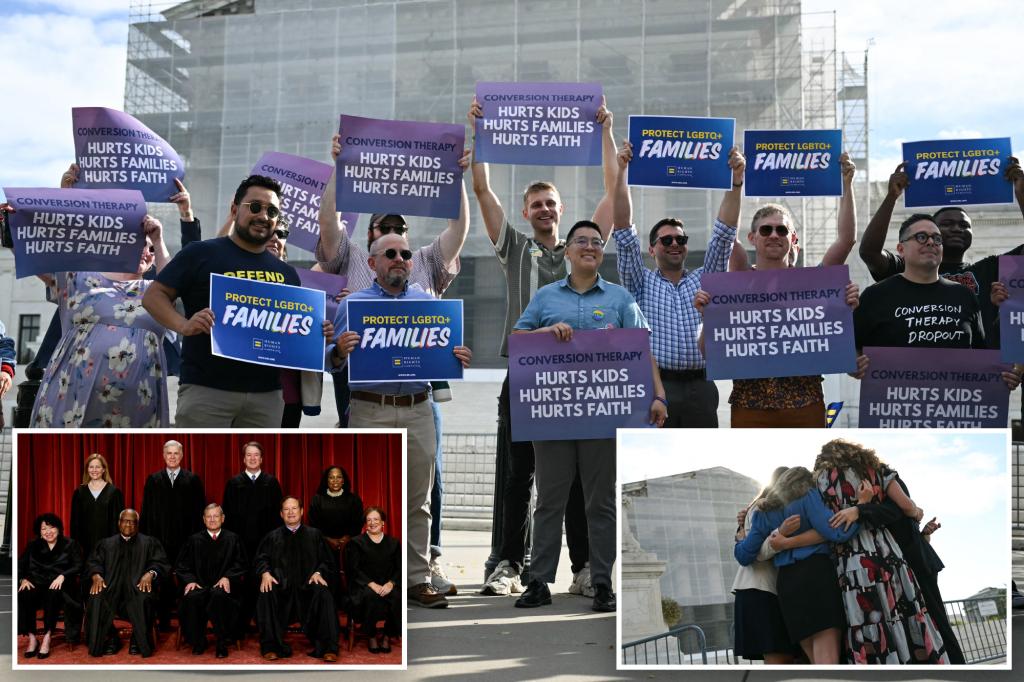WASHINGTON — The nine Supreme Court justices splintered Tuesday over a challenge to a Colorado law banning licensed mental health professionals from performing voluntary conversion therapy to change the sexual orientation or gender identity of minors.
Conservatives on the high court sounded skeptical about the constitutionality of the 2019 ban, while the three liberal justices seemed to lean against arguments by attorneys backing Christian therapist Kaley Chiles.
“Just because they are engaged in conduct,” Chief Justice John Roberts said of conversion therapists, “doesn’t mean their words aren’t protected.”
The Colorado law, which mirrors regulations in nearly two dozen other states, prohibits medical practitioners from performing treatment that “attempts or purports to change an individual’s sexual orientation or gender identity.”
Chiles filed a lawsuit arguing that banning talk therapy aimed at converting one’s sexual orientation or gender identity violates her free speech rights.
“This is an unusual case,” began liberal justice Sonia Sotomayor, “because we have basically six years of no enforcement of this law — three before this lawsuit, three since — and we have the entity charged with administering the law saying, ‘We’re not going to apply it to your kind of therapy.”
During oral arguments Tuesday, Chiles’ attorney, James Campbell, sought to contrast talk therapy with invasive procedures such as the administration of medicine or electronic shocks, which he seemed to acknowledge can be regulated.
“This law prophylactically bans voluntary conversations, censoring widely held views on debated moral, religious and scientific questions,” Campbell argued. “Aside from this law and recent ones like it, Colorado hasn’t identified any similar viewpoint-based bans on counseling.”
Colorado Solicitor General Shannon Stevenson that medical professionals subject to liability for professional wrongoing are different from “people out in the world going about their business.”
“This has been an area that has been heavily regulated from the beginning of our country,” Stevenson contended, “and no one has ever suggested that a doctor has a First Amendment defense to give the wrong advice to their patient.”
At one point, Sotomayor tried to back up that point by raising a hypothetical about whether states could instruct dieticians not to tell “anorexic patients to engage in more restricted eating.”
Liberal justice Ketanji Brown Jackson expressed befuddlement that a “therapist who is acting in their professional capacity” would be engaging in First Amendment expression.
The conservative justices peppered Stevenson with questions about whether Colorado’s ban amounted to viewpoint discrimination.
Justice Neil Gorsuch noted that homosexuality in the 1970s was generally seen as a mental health disorder and asked whether the legal theory championed by Colorado would have allowed a law to ban talk therapy affirming one’s sexual orientation.
Stevenson indicated it would have.
The conservative wing of the court also probed the evolution of the standard of care — practices that are widely accepted as proper treatment within the medical community.
“Have there been times when the medical consensus has been politicized? Has been taken over by ideology,” pondered Justice Samuel Alito, who later asked: “Was there a time when many medical professionals thought that certain people should not be permitted to procreate because they had low IQs?”
During oral arguments, Campbell had pushed back at claims by the state that conversion therapy had proven harmful to minors.
“Colorado certainly cites studies, but those studies suffer from significant flaws,” Campbell said. “The main flaw in all of them is that they lump together dissimilar approaches. They treat voluntary conversations the same as shock therapy.”
Meanwhile, multiple justices — including Sotomayor, Jackson, and Barrett — suggested the possibility of sending the case back to the lower courts for so-called “strict scrutiny” analysis, which would put the burden on Colorado to prove the law is constitutional.
At one point, liberal Justice Elena Kagan asked Stevenson to assume they were in “normal, free speech land, rather than in this kind of doctor-land.”
“If a doctor says, ‘I know you identify as gay, and I’m going to help you accept that,’ and another doctor says, ‘I know you identify as gay and I’m going to help you to change that,’ and one of those is permissible, and the other is not, that seems like viewpoint discrimination,” she said.
Stevenson concurred and reiterated her assertion that medical speech is different from free speech.
The case, Chiles v. Salazar, is among the most high-profile on the Supreme Court’s docket this term, which kicked off Monday.
The Colorado law has previously been upheld by multiple lower courts, including the Denver-based 10th Circuit Court of Appeals.
Read the full article here

